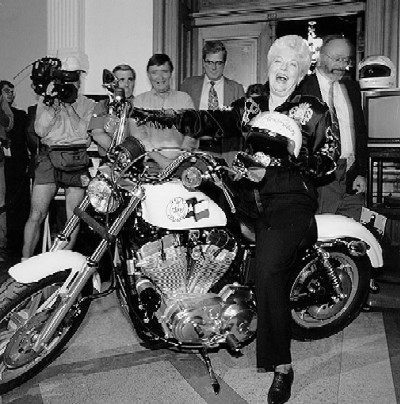John Updike has won the $30,000 Rea Award — an award granted to “a living American or Canadian writer who has made a significant contribution in the discipline of the short story as an art form.” It’s good to see that the Dungannon Foundation has gone out of its way to honor a writer who truly needs more cash and awards. It is rumored that Mr. Updike’s interior designer will apply these funds to the east wing living room.
Month / September 2006
DFW Gets the VidLit Treatment
No Booker Love for Mitchell This Year
At long last, the Booker Shortlist has been announced. And David Mitchell’s Black Swan Green didn’t make the cut. Also stubbed out: Peter Carey. Personally, I pin the blame on Fiona Shaw for this great oversight.
Then again, one must question an organization that actually considered DBC Pierre’s Vernon God Little as an exemplar.
The shortlist, which is truly a collection of surprises, is as follows:
Kiran Desai’s The Inheritance of Loss
Kate Grenville’s The Secret River
M.J. Hyland’s Carry Me Down
Hisham Matar’s In the Country of Men
Edward St Aubyn’s Mother’s Milk
Sarah Waters’s The Night Watch
The Myth of “Stealing” Ideas
Tayari Jones notes an exchange she had with a young writer who was terrified of sending her work to an agent because this writer believed that her work would be “stolen.” I think Tayari is right to suggest that this is a crisis of confidence. Literary agents simply do not have the time to “steal” anyone’s work. And think about it. Why would they open themselves up to an expensive legal battle when they are already drowning in manuscripts and strapped for time and money? Further, even if a writer can make the case that the work was “stolen,” do you honestly think that this is the only idea a writer’s ever going to come up with?
I once met a temp who was convinced that the producers of the movie Michael had “stolen” her screenplay about an angel fond of debauchery.
“Did you register your screenplay with the WGA?” I asked.
She hadn’t. And, in fact, upon close examination of her story, I realized it was bullshit. She mentioned Pete Dexter, but could not convince me that she had met with any producers, much less signed any contract. I pointed out to her that sometimes ideas come in patterns, pointing to all of the Freaky Friday-like movies of 1988 (Big, Vice Versa and Like Father, Like Son). But she was unfazed. She was convinced that the producers had “stolen” the idea from her.
What’s more, this woman was extremely miserable about it. And this was the excuse she had made to stop writing.
When I was a younger and more foolish man, I was pissed at Tab Murphy in 1995 because of a movie called Last of the Dogmen. Shortly after high school, I had written a screenplay about some teenagers stumbling upon a forgotten tribe of Native Americans. But this Tab Murphy guy managed to get the movie made before I could attract any interest. And what’s more, it starred the insufferable Tom Berenger. The bastard! Still, I didn’t let it faze me and I kept writing.
I’ve seen posts and associations I’ve made on this website seemingly pilfered by newspaper columnists. Or were they? Really, why should I be so self-important to think that they got the ideas from me?
The point of all this is that if you’re a writer clinging to the stubborn notion that someone is out there to “steal” your work, and if you are letting this get in the way of writing, submitting, or pitching, then I ask you for the good of humanity to step out of the way. Take up something else. All good writers are idea machines. All good writers have distinct and original voices in which an “idea” is just one component of an equation as intricate and inexplicable as love.
Perhaps this fundamental misunderstanding of the writing process is what causes so many people to ask the question, “Where do you get your ideas from?” Would these same people ask a bookkeeper, “How do you keep focus when you’re inundated with so many numbers?” It’s just the way writers are wired. For a writer, ideas flow through the noggin like a barely controllable fire and trying to manage all this is a bit like a good head rush during a run. There’s really nothing writers can do about this other than set it down on paper and do the best they can to convey this frenzy in coherent terms. If they’re lucky, they can make a living at this.
RIP Ann Richards

Houston Chronicle: “Late in her term as governor, the Houston Chronicle asked Richards how she viewed her gubernatorial legacy. ‘How about, “She changed the economic future of Texas,”‘ Richards replied. ‘And that really beats what I feared my tombstone was going to say, and that was: “She kept a really clean house.”‘”